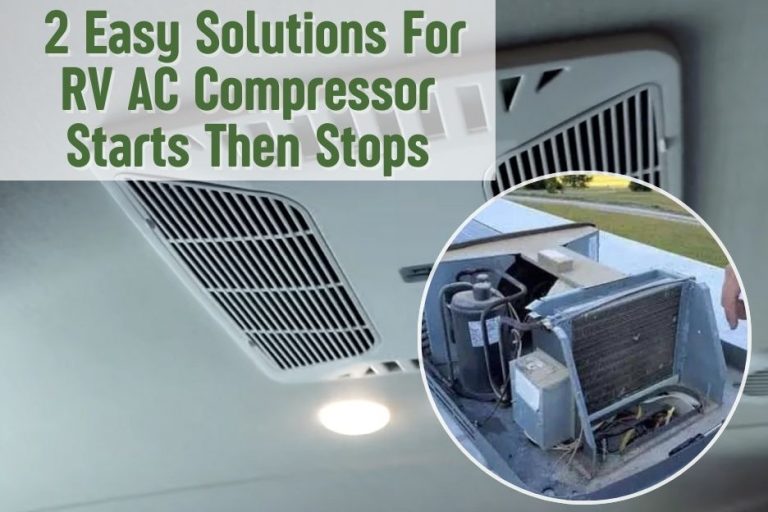Generator Quiet Box for Camping: 5 Solutions For Quiet Operation
If you are a camper, you can’t neglect the importance of a generator quiet box for camping. This will make your experience as peaceful as possible. Today, we will explore six solutions for achieving a low-noise operation during the adventures.
Read on to learn about the best quiet boxes and generators available on the market. We will also dive into the best DIY methods for creating sound barriers for your own machines.
Let’s get right into it!
Table of Contents
Understanding the Concept of a Generator Quiet Box
Portable generators are generally noisy, starting at 69 dB and going up to 80 or 100 depending on the size and model. This is where a generator quiet box comes in handy.
It has sound-absorbing materials which drastically lowers the noise. The best thing is that it suppresses all kinds of noises whether they may be from the engine or the exhaust.

Understanding The Functionality of a Generator Quiet Box
A quiet box is best for lowering the noise while allowing the generator to function normally. It is basically a sound-proof cage for your generator. Let’s check out the working basics:
- It is made from materials like Medium-density fiberboard (MDF) or acoustic panels that help lower the noise.
- There is also a ventilation area made so that the gases from the generator are directed outwards.
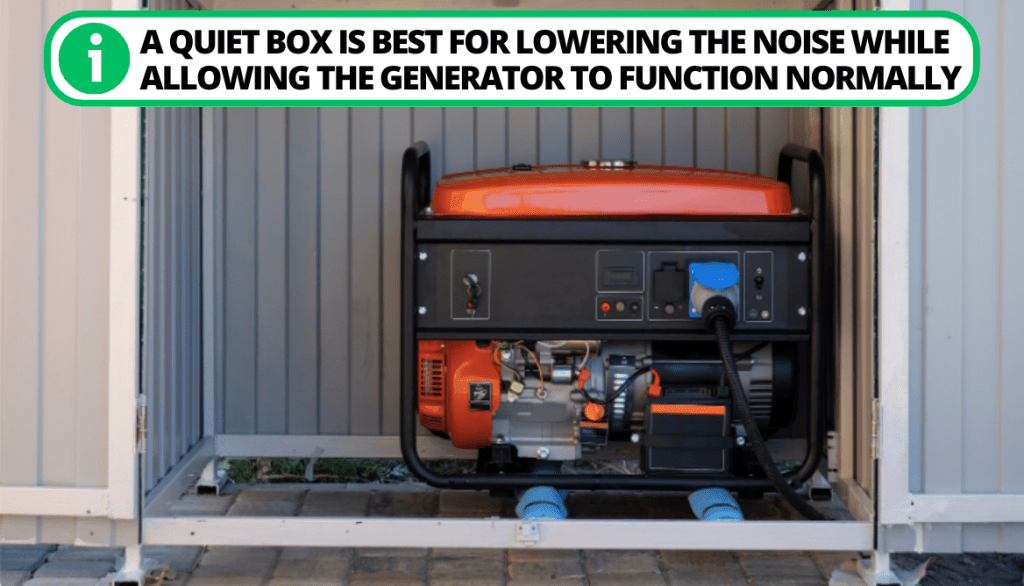
Decibel Levels of a Typical Generator
Normal generators can produce noise levels between 75 decibels when measured from a distance of 23 feet. To give you an idea, a regular conversation is around 30 – 60 dB, while a lawnmower or vacuum cleaner can range from 70 to 90 dB.
Larger generators and especially older models generally create more noise. However, newer advancements have led to quieter models with noise levels as low as 50 dB, known as super quiet/inverter generators.
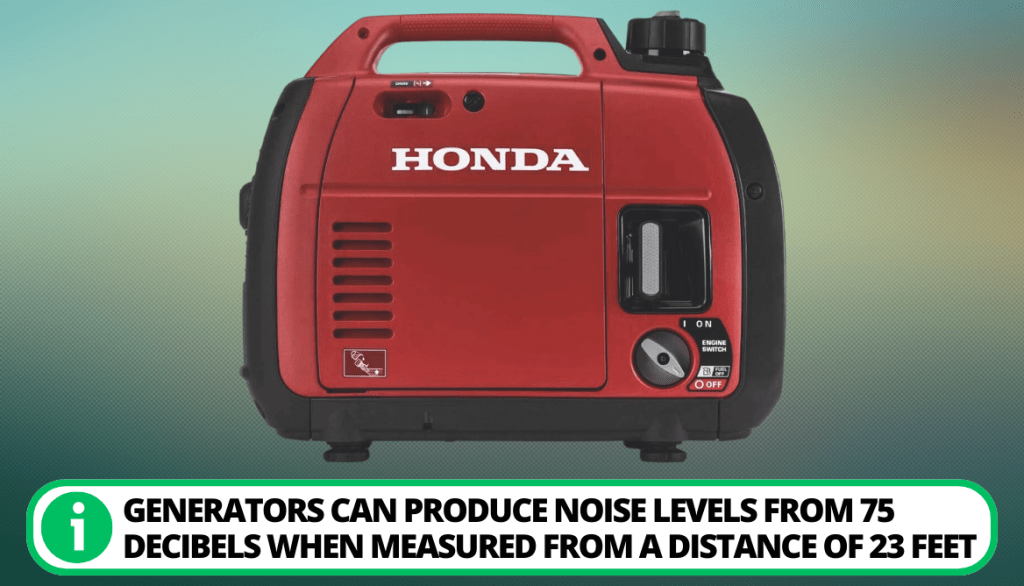
6 Factors Contributing to the Noise of a Generator
Before exploring the best quiet boxes, it is best to first analyze the problem at hand. Why is the generator making so much noise in the first place? Well, there can be a few different reasons such as:

- Oversized/Overloaded: The amount of power your generator has directly affects the resulting noise as well. A large model will be pretty noisy when compared to a portable generator. But, never make the mistake of buying a small portable generator and then overloading it as it damages the engine quite a bit.
- Old (Worn Out): A new generator is always quiet compared to an older one. As it gets used over time, the engine tends to get noisier. There are many moving parts in a generator like the rotor that start wearing out after some time.
- No Soundproofing: If you are running an old generator then it might not have any sort of soundproofing. Newer models especially the ones designed for camping do come inside plastic enclosures. This reduces the overall noise.
- Older Tech: All of the older generators have technology that is not updated and thus produces a lot of noise. A new quiet generator comes equipped with inverter tech that makes it super quiet.
- Near to Camp: Sound spreads quickly and dissipates as well. Therefore, you should never have the generator right beside your sitting area. Place it as far away as you can. This will significantly reduce the sound of the loud generator.
- Placed on a Hard Surface: If you have your noisy generator placed on a hard surface, then the vibrations won’t be absorbed. This will result in them coming back to the machine’s body and creating resonance. Basically, you will need to deal with extra noise. Therefore, never put it on a hard surface to make the generator quieter.
If you want the best solution for quiet operation, we recommend you check out the list below!
3 Top Quiet Box Options for Camping
Let’s explore the best quiet box options available to ensure a peaceful outdoor experience:
1. Zombiebox Generator Running Cover
It is an amazing quiet generator box as it has really good build quality alongside weather protection. It not only makes the generator quieter but also protects it from rain, snowfall, etc. You can even fit a big model inside it without any problems. Overall, it is a great product that is worth the price.
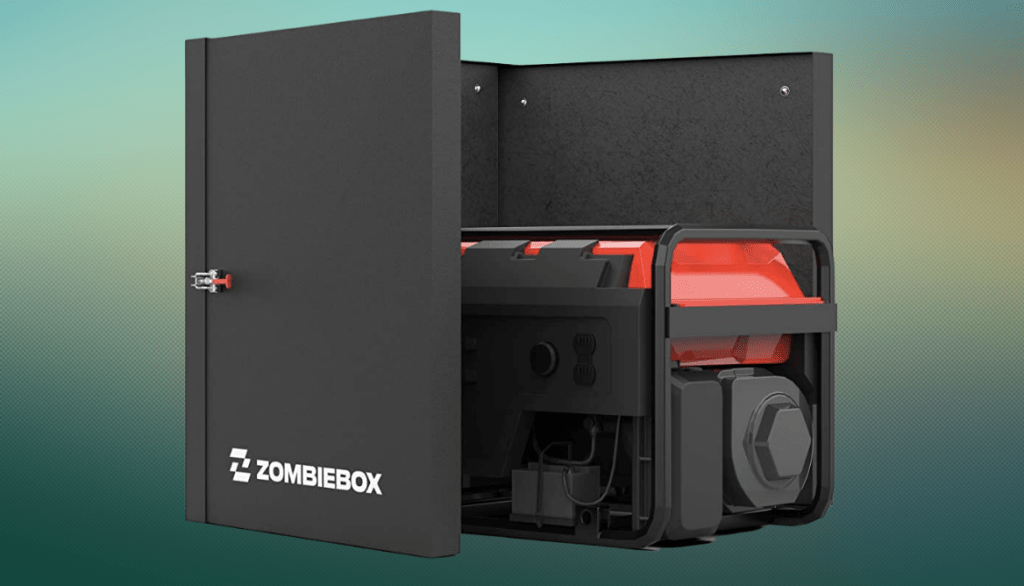
Specs
Listed below are the specifics of this product:
Material: | Galvanized Steel |
Water Resistance Level: | Waterproof |
Generator Support: | Up to 12,000 watts |
Weight: | 52 pounds |
- It significantly reduces the sound of a noisy generator.
- Pretty easy to assemble and using it is also very straightforward.
- Great at protecting the generator from harsh weather.
- The build quality is pretty good and is very sturdy.
- The coating starts to come off after some time but it doesn’t affect the performance.
2. Microfab Generator Enclosure
The Microfab quiet generator box is another great choice if you are tired of loud sound output. It is good at lowering the noise while also providing good ventilation for the gases. The top side is plain and thus protects the generator from rainfall.
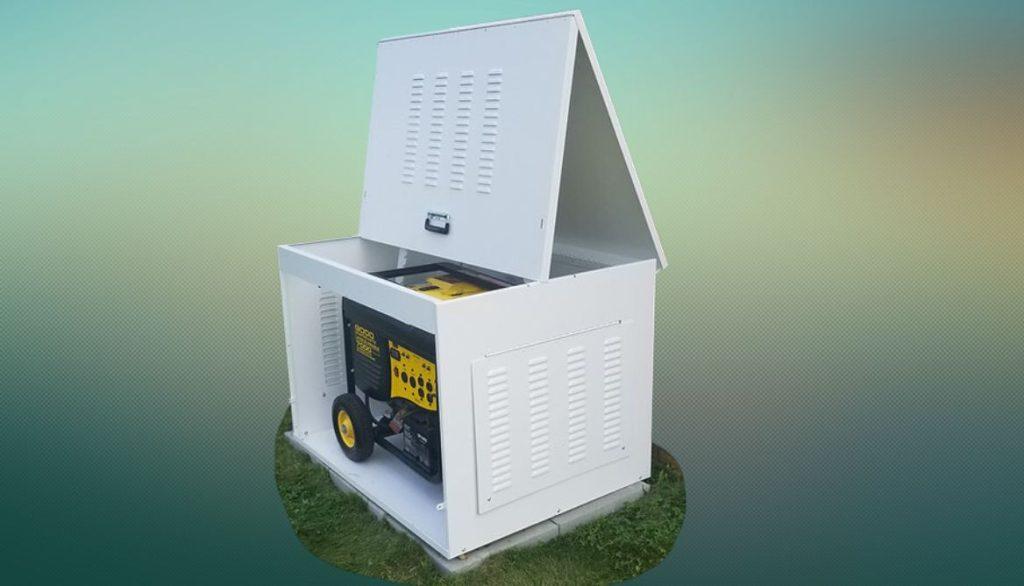
Specs
Let’s explore the specs below:
Material: | Powder Coated Aluminum |
Water Resistance Level: | Partially Resistant |
Generator Support: | Small to Medium Sized |
Weight: | 235 pounds |
- It has a solid aluminum build and will last for a long time.
- The design is really good and there is plenty of space for ventilation as well.
- This generator box also protects it from rough weather.
- The assembly process is very simple.
- It is not a cheap product and comes with a hefty price tag.
3. Echo Barrier Mini Genset M1
If you aren’t afraid to pay a premium price, then you won’t find anything better than the Genset M1. It is a superb product that not only provides high quality but amazing functionality as well. It is water and fire-resistant and great at lowering the noise that the generator produces. You can easily deploy it using the velcros.
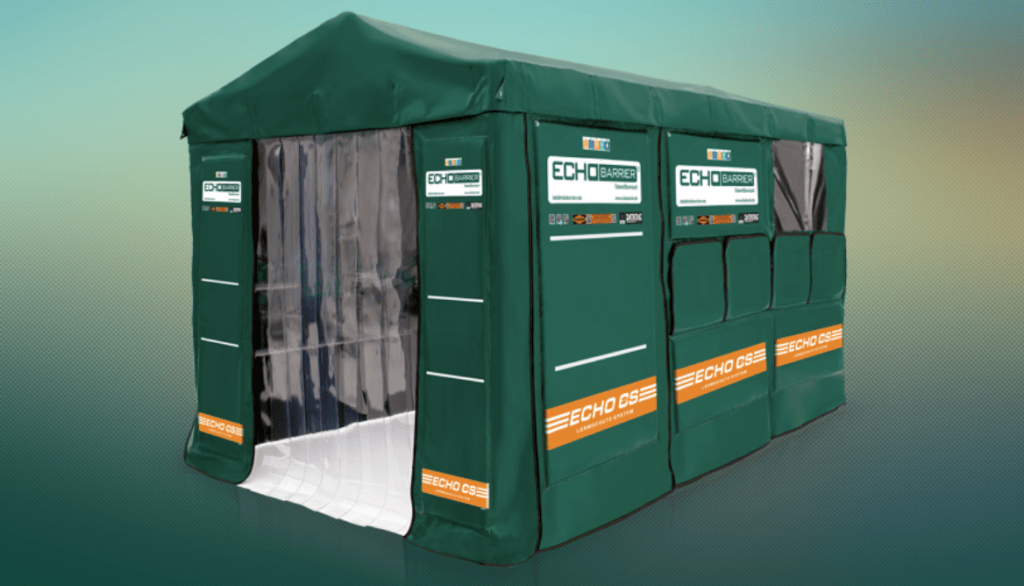
Specs
The following are the specs of this product:
Material: | Aluminum |
Water Resistance Level: | IPX6/IPX9 Resistant |
Generator Support: | Small Generators and Power Units |
Weight: | 55.5 pounds |
- It has a breathable material that is great at reducing noise output.
- The material is fire and water-resistant so you don’t need to worry about it.
- It is really easy to deploy due to the velcro attachments.
- M1 is highly durable and provides extreme protection and maximum noise reduction.
- Only suitable for small generators.
Best DIY Methods For A Quiet Generator
If you prefer not to invest in a quiet box. You can use some DIY methods to reduce generator noise during camping. These cost-effective alternatives can significantly reduce the loud noise and allow you to enjoy a quieter experience.
Here are some of the best DIY methods that you can use to make a generator quiet:
1. DIY Generator Enclosure Box
In order to have a quieter generator, one of the easiest ways is to make your own enclosure box. This is great for people who own a camping generator. You will need the following items:
- Insulation
- Foam Insulation
- Duct Tape

Steps
Following are the steps for creating a quiet generator box:
- Measure the insulation around the generator two times and then start the cutting.
- Move on to the foam insulation and also measure it twice before cutting.
- Now you have to attach the foam to the insulation via duct tape.
- Surround your generator with this enclosure.
2. Anti-Vibration Pads
One of the easiest ways to make your camping generator quiet is by reducing the vibrations. These are more prevalent if it is present on a hard surface. In order to get rid of these vibrations, you can use rubber pads.
You can easily make these pads from any type of rubber. It just needs to be thick enough to work as an absorber. It will make a generator quiet by reducing the vibrations. If you can’t do it yourself, anti-vibration pads are readily available on Amazon as well.
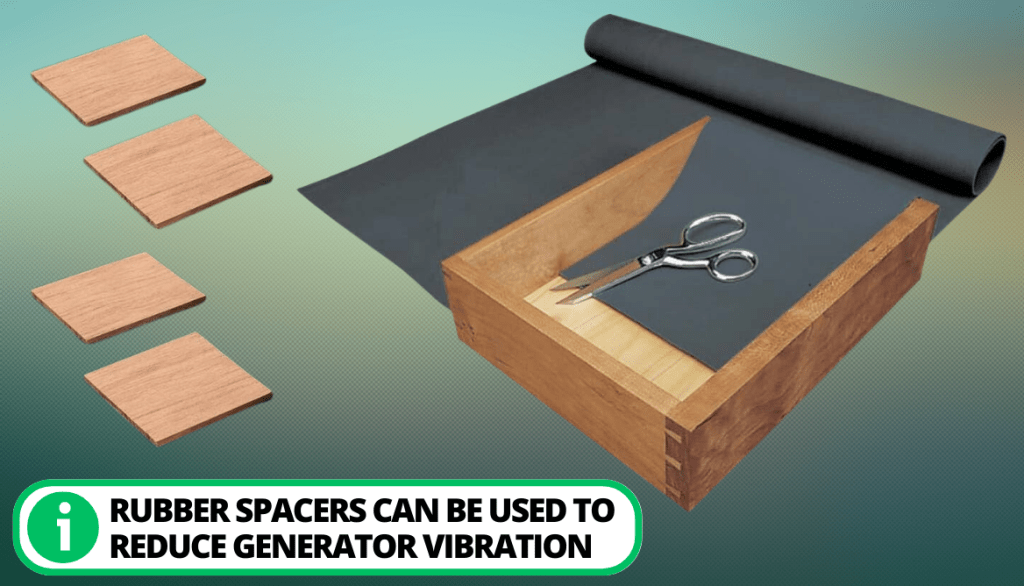
3. Checking the Muffler
The gases from the exhaust pipe are a major cause of noise in all engines. A generator muffler helps to reduce noise. If your generator is noisy, then you should probably take a look at its muffler. Follow these steps:
- The muffler is normally hidden behind the back cover. Its tailpipe is visible outside.
- Remove the cover and look for any leaks or holes.
- If the generator’s exhaust pipe is old and rusty, replace it with a new one.
- The installation is pretty simple but you can also take help from a local mechanic as well.

Secondary Muffler
You can also install a secondary muffler with the existing one to further reduce the noise. It works really well if the primary one is not working.
- You can install any bike or car muffler as long as the diameter of the generator’s exhaust pipes is the same. It is generally better to use a bike muffler as it is more suitable for a generator.
- While installing it, make sure that the exit pipe is pointing away from the motor.
- Avoid welding it to the generator’s body. As this will transfer the vibrations to the body, making it more noisier.
If you are able to properly install a 2nd muffler, it can reduce the noise by 25%.
4. Exhaust Pipe Position
The position of the exhaust pipes also influences the noise produced.
- If the pipes are in a horizontal position, you get more noise. While in vertical, the dispersion is higher and thus, it is not that loud.
- Most camping generators have an exhaust pipe in a horizontal position which makes them more noisy. The easy fix to this problem is by using an exhaust extension.
- You need to mount it to the end of the exhaust pipe and turn it upwards. This extension will make a generator quiet.
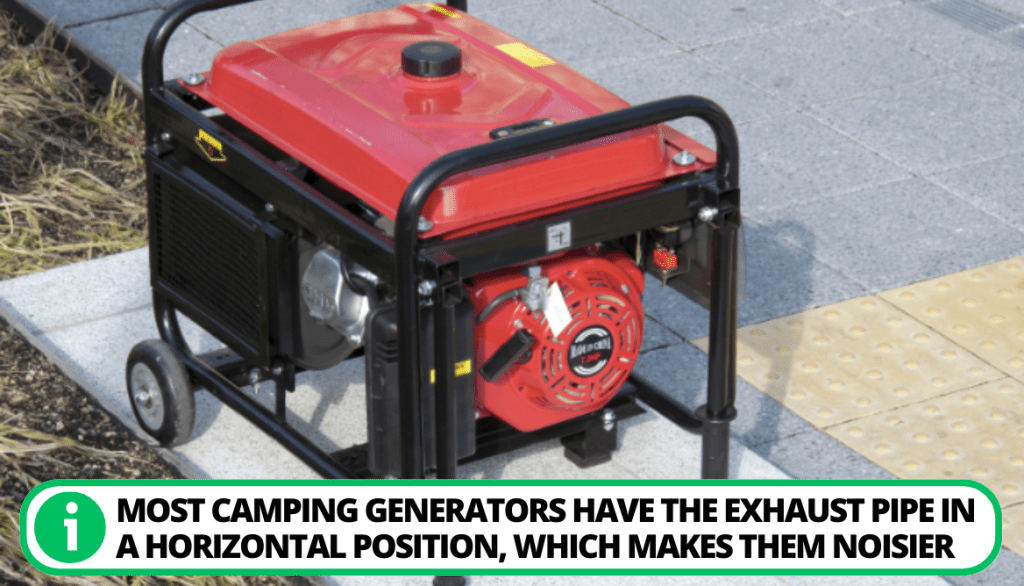
5. Water As A Sound Dampener
If you do not want to make any changes to your generator then there is another trick to lower the noise. You don’t need to use any muffler, just a bucket of water. You need the following things:
- A steel pipe preferably flexible.
- Drum or bucket with a 5-gallon capacity.
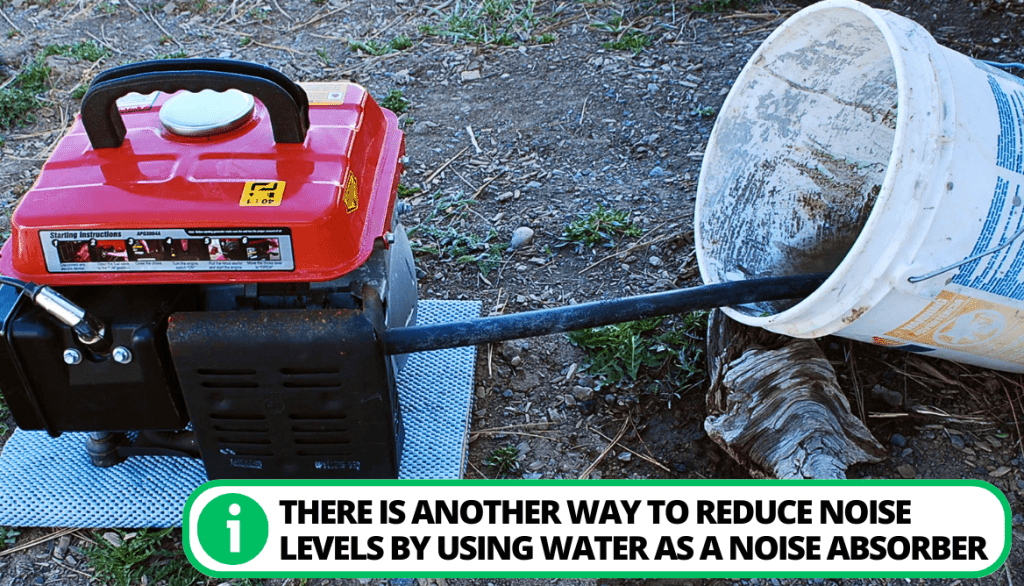
Steps
The following is a 3 step-easy process for sound dampening:
- Connect one end with the exhaust pipe and the other one in the water.
- When the generator is turned on, the exhaust gets filtered through water.
- This process dampens the sound of the generator.
6. Location of The Generator
Sound dispersion increases with more distance. So, you can make a generator quiet by moving it away from the campsite. If you’re a solo camper then this is the best solution.
In ideal conditions, the inverter generator should be 7 meters away from the camping site. You can increase this distance if you have an extended cord for more noise reduction.
Check out this helpful video for further details.
Top 3 Quiet Generators for Camping
Alternatively, if you prefer a ready-made solution, there are generators available on the market that produce minimal noise. We have made a list of our top picks for quiet generators. Let’s explore the options down below:
1. Energizer eZV2000P
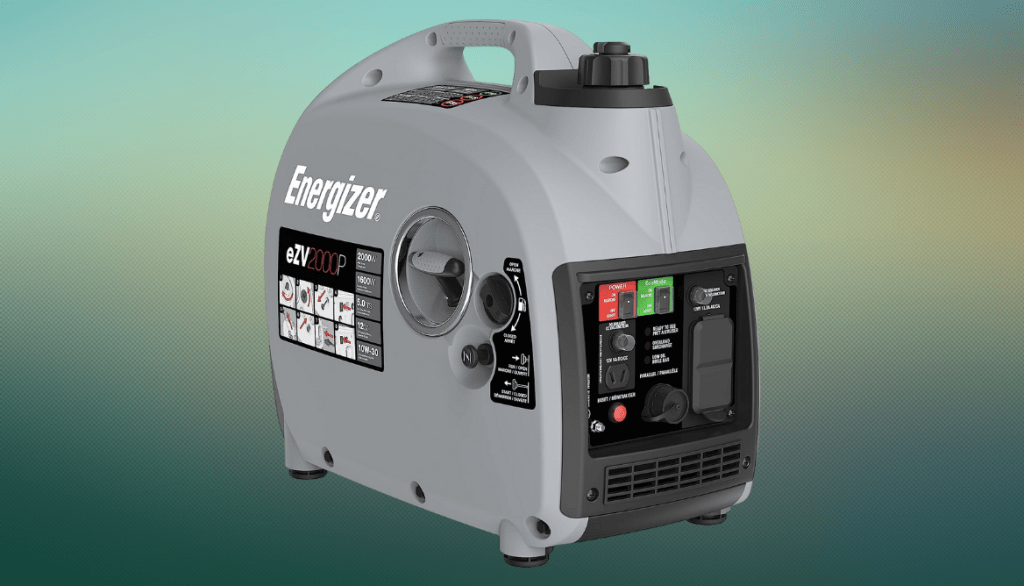
It is a high-powered inverted with a 2000-watt stable output. With its parallel port, you can easily connect two eZV-series of generators. With a 1600-watt load, it runs up to 4.2 hours which is pretty good. Even when it is running, it is really quiet at 56 dB. There is an economy mode that enhances the run time and lowers the fuel consumption.
2. Honda EU2200i
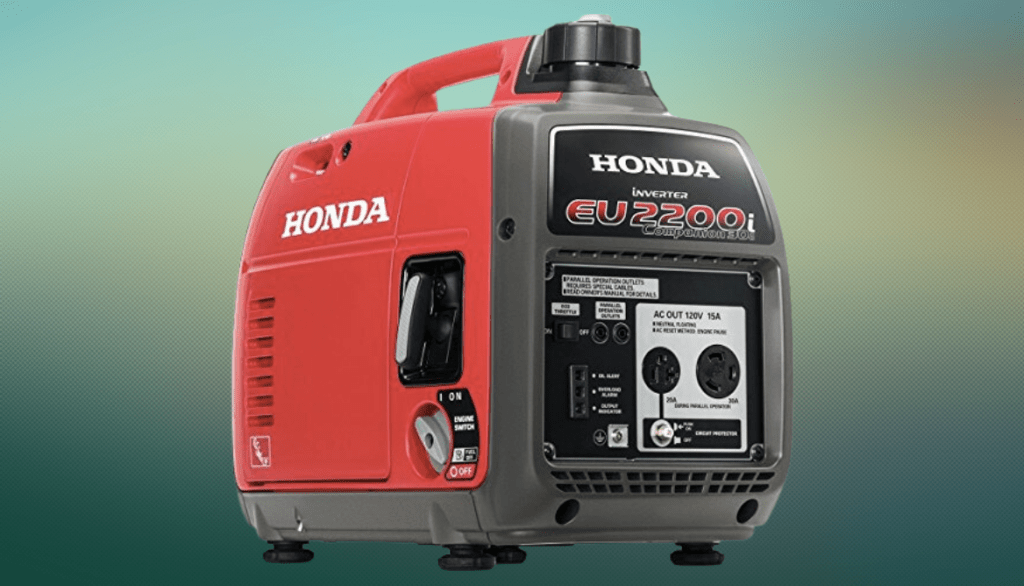
If you are looking for a quiet and lightweight inverter, then the EU2200i is a great choice. It features a maximum of 2200-watt output. It is ideal for camping with its design and build quality. It has a 4 stroke engine with a maximum runtime of 8 hours. It is really quiet and easily runs most things.
3. Champion 3400
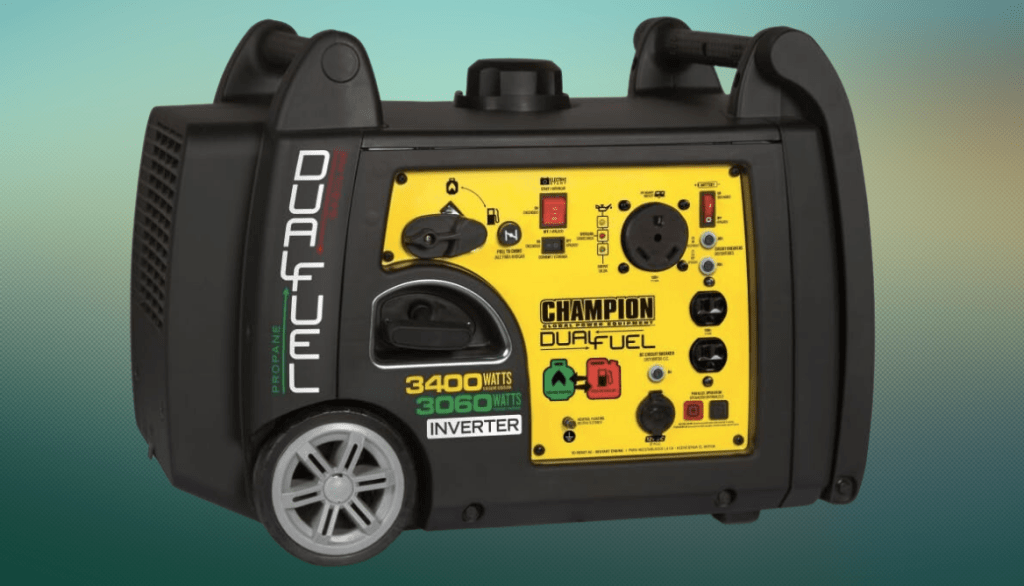
This inverter is quite powerful with its duel fuel tech. You can run it either on propane or gasoline. It also comes with a shut-off sensor as well. It has a maximum output of 3400 watts. It is perfectly suited for RVs and camping due to its 59 dB quiet operation. You get 3 years of warranty with free technical support for life.
FAQ
What box reduces generator noise?
A quiet generator box reduces the generator noise. It is specially designed to contain and dampen the sound waves generated during operation.
How do I soundproof my generator?
To soundproof your generator, you can create a soundproof enclosure, using foam insulation, or use anti-vibration pads to minimize noise transmission.
Can I run a generator in a box?
Indeed, you can run a generator in a box but there needs to be some sort of ventilation. All the gases coming out of it needs to get displaced in the air.
What is the best material for a generator sound box?
The best material for a generator sound box is high-density plywood or medium-density fiberboard. Incorporating sound-absorbing materials such as foam insulation or acoustic panels inside the box can further enhance noise reduction.
Conclusion
Summing it up, a generator quiet box is a valuable piece of equipment for reducing noise during camping trips. If you don’t have an enclosure, you can opt for anti-vibratory pads and mufflers. Further, you can also consider changing the position of the exhaust pipe.
And, if you want to avoid all the hassle, just buy a quiet generator equipped with the latest tech. Our recommendation would be to go for Zombie quiet generator box as it can reduce noise output by a large margin and is cheaper than the competition.
What technique are you using to lower the generator sound and how effective it is? Share your thoughts in the comments!

I`m a current Law Enforcement Officer working within the Counterterrorism Bureau in New York State. I have been Camping for over 20 years. My styles of camping include tent, car, truck, van, and RV travel trailer. I have a YouTube channel where I teach all types of camping with an entertaining method: https://youtube.com/@TheSmallsRVAdventures

